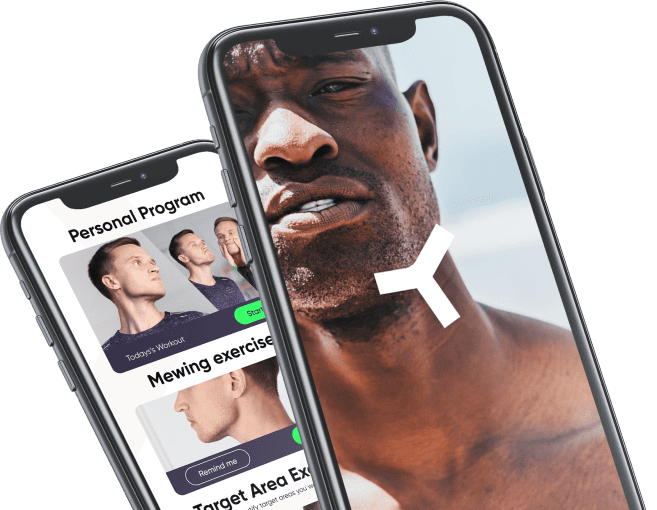Many people are turning to mouth taping as a solution for better sleep, especially if they struggle with snoring or mouth breathing at night. The idea is to encourage breathing through the nose, which can lead to more restful sleep.
Overall, for most people, using mouth tape is safe and can help keep the lips closed during sleep. But it’s essential to be cautious if you have issues like nasal congestion or respiratory problems, as mouth taping could make things worse.
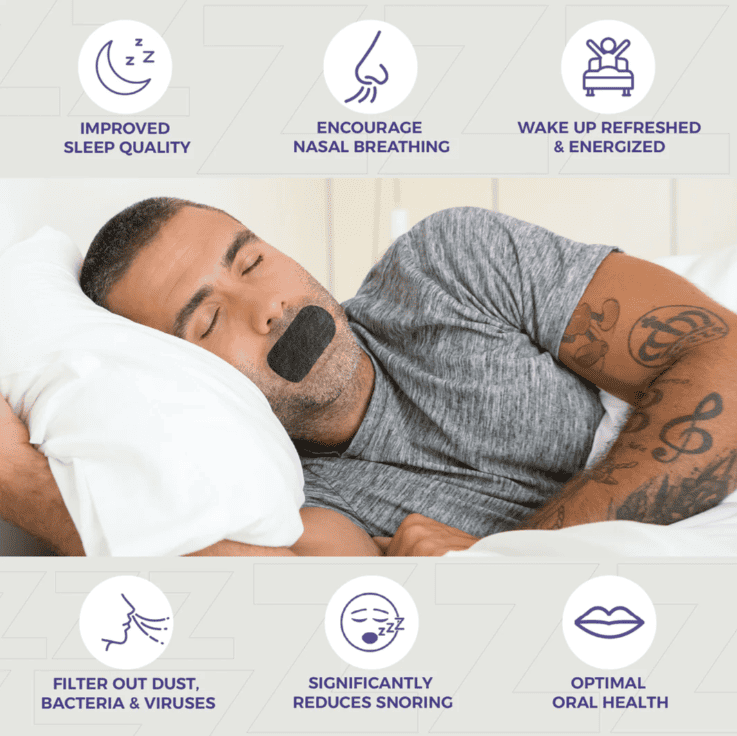
Let’s dive deeper and assess the effectiveness, potential risks, and alternative options to mouth tapes, aiding you in determining if they suit your needs.
Understanding Mouth Taping
Mouth taping involves gently sealing your lips during sleep to encourage breathing through your nose instead of your mouth. This approach aims to address problems like snoring and dry mouth, promoting a more refreshing sleep experience.
By keeping your lips closed, mouth taping helps prevent air from escaping through your mouth, supporting better airflow through your nose for improved sleep quality. In our comprehensive guide on mouth taping, we delve into what it is and why people use it while sleeping in more detail.
The Science Behind Nasal vs. Mouth Breathing
Nasal breathing during sleep offers a multitude of physiological benefits compared to mouth breathing. The nose acts as a natural filter, humidifier, and warmer of air, lowering the risk of infections and enhancing oxygenation in the bloodstream.
Additionally, nasal breathing triggers the production of nitric oxide, which not only boosts exercise performance but also enhances cognitive function by aiding brain activity and interconnections.
On the flip side, mouth breathing can lead to dental issues like tooth decay, and gum disease, and difficulty swallowing. Scientists highlight the pivotal role of nasal breathing in regulating respiration during sleep, whereas mouth breathing might contribute to sleep disorders such as obstructive sleep apnea.
Is Mouth Tape Safe?
Mouth taping is considered safe for most healthy adults. However, it’s crucial to consult a doctor before trying it, especially if you have:
- Allergies to adhesive materials
- Breathing difficulties or nasal congestion
- Underlying health conditions like sleep apnea
These factors can increase potential risks like skin irritation, discomfort, or, in very rare cases, choking. It’s vital to prioritize safety and seek professional guidance before attempting mouth taping for sleep.
Potential Dangers of Mouth Taping
While mouth taping may seem like a simple approach to sleep improvement, it comes with potential dangers, especially for individuals with certain health conditions. Here’s a breakdown of the possible risks:
- Difficulty breathing or suffocation. This is a concern for those with pre-existing respiratory conditions or severe nasal congestion, as the tape could hinder their ability to breathe adequately through their nose.
- Allergic reactions to adhesive. The adhesive materials used in the tape can trigger allergic reactions in some individuals, causing discomfort and irritation.
- Skin irritation or damage. The tape’s repeated application and removal can irritate the delicate skin around the lips, leading to redness, dryness, or even tearing.
- Aggravation of sinus infections. Mouth taping can worsen existing sinus infections by preventing proper drainage of mucus.
- Aspiration risks if vomiting occurs. If vomiting occurs during sleep while the mouth is taped, there’s a risk of aspirating stomach contents into the lungs, which can be serious.
- Potential for increased anxiety or panic. The feeling of having your mouth taped shut can induce anxiety or panic, especially in claustrophobic individuals.
- Interference with emergency breathing needs. In emergency situations requiring medical intervention, the tape might hinder access to administer oxygen or other treatments
- Aggravation of underlying respiratory conditions. Mouth taping can worsen pre-existing respiratory conditions like asthma or COPD by making breathing more difficult.
- Impaired oral evacuation in case of emergency. The inability to open your mouth fully due to the tape can hinder the natural process of clearing saliva or mucus, potentially posing a risk in certain situations.
- Risk of choking on saliva or mucus. In rare cases, particularly for individuals with excessive saliva or mucus production or swallowing difficulties, there’s a slight risk of choking.
Is Mouth Tape Effective?
How effective is mouth taping, is a topic of debate, drawing from both scientific research and anecdotal accounts. The latter often highlights positive outcomes, with users claiming reduced snoring and better sleep. While scientific research supports some benefits, further studies are needed to fully evaluate the effectiveness of mouth taping as a sleep aid.
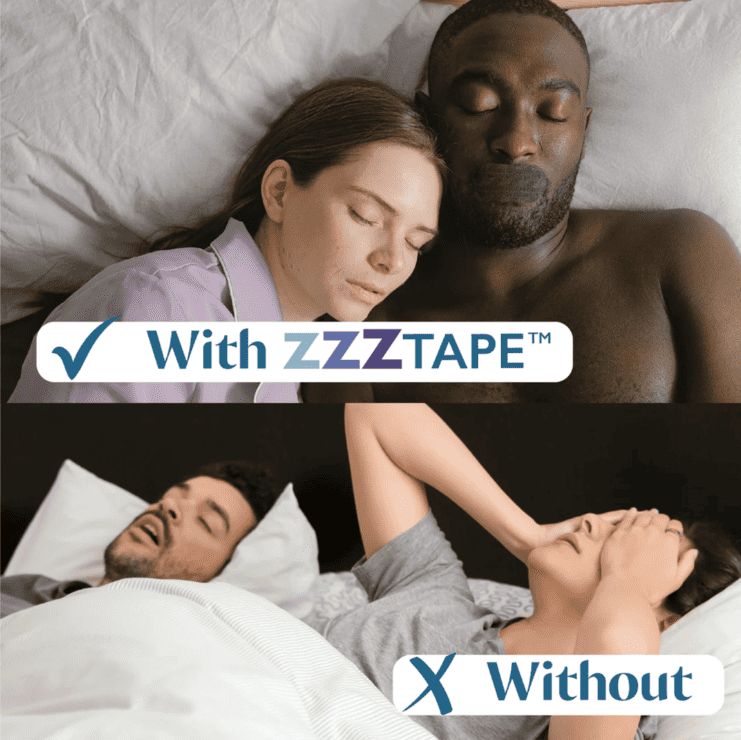
Anecdotal Success vs. Scientific Evidence
Users claim mouth taping reduces snoring and makes sleep more restful. Many also mention improved breathing and less dry mouth. However, it’s worth noting that if you’re sensitive to peeling off adhesive, it might not be the best option for you, as the tape can be quite strong.
Interestingly, some studies, support these claims, suggesting that mouth taping could help with snoring and mild obstructive sleep apnea cases by encouraging nasal breathing. However, more research is needed to confirm these findings and understand mouth tape’s overall effectiveness for sleep issues.
Due to conflicting results and potential risks, it’s crucial to consult a doctor before considering mouth taping and explore safer alternatives with established scientific support.
Safe Alternatives to Mouth Taping
While mouth taping might seem appealing, it’s not for everyone. Therefore, here are some alternatives you might want to consider:
- CPAP Machines. These devices deliver continuous positive airway pressure through a mask, effectively keeping your airways open throughout sleep. Often used for treating moderate to severe sleep apnea, they require a doctor’s prescription and fitting.
- Positional Therapy. This involves training yourself to sleep on your side, which can help keep your airway open and reduce snoring. It’s a simple, non-invasive approach, but maintaining the position throughout the night can be challenging.
- Mandibular Advancement Devices (MADs). These mouthpieces gently push your jaw forward, opening a partially collapsed airway due to relaxed jaw muscles, reducing snoring. While effective for some, they can cause jaw discomfort or teeth shifting, requiring proper fitting by a dentist.
- Tongue Stabilizing Devices (TSDs). These too are a type of mouthpiece for those who suffer from snoring and sleep apnea. They prevent the tongue from falling back and blocking the airway during sleep. They work by gently holding the tongue in a forward position, preventing it from collapsing and keeping the airway open.
- Nasal Dilators. Nasal dilators are small devices placed inside the nostrils to improve airflow by opening up nasal passages, making them an excellent option for individuals who struggle with nasal congestion or breathing difficulties during sleep
- Buteyko Breathing Technique. This technique focuses on retraining your breathing patterns to promote nasal breathing and improve sleep quality. It requires guidance from a certified practitioner but can be a long-term solution for some individuals.
- Oral Pressure Therapy. This involves using a special device that applies gentle pressure under the chin, helping to keep the airway open during sleep. While showing promise in research, it requires further investigation and is not yet widely available.
- High Humidity Humidifiers. Adding moisture to the air can loosen mucus and ease congestion, potentially reducing snoring. Look for Sleep Apnea Pillows designed to elevate your head and promote better breathing, often used in conjunction with humidifiers.
- Nasal Strips. For individuals specifically looking for the best nasal strips, these adhesive strips are placed over the nose to help open up nasal passages and improve airflow, making them a convenient and non-invasive option for addressing snoring and mild nasal congestion.
- Sleep Apnea Pillows. Sleep apnea pillows are specially designed pillows that help keep the head and neck aligned to prevent airway obstruction during sleep, making them a comfortable and supportive option for individuals with positional sleep apnea.
When to Seek Professional Advice
It’s crucial to seek professional advice when dealing with sleep-related issues rather than attempting self-treatment. A healthcare provider can conduct a thorough evaluation to accurately diagnose any underlying conditions contributing to sleep disturbances. They can also recommend appropriate treatment options tailored to individual needs, ensuring safety and effectiveness.
Delaying or avoiding seeking professional help may lead to worsening symptoms or overlooking potentially serious health concerns. Don’t hesitate to reach out to a healthcare professional for personalized guidance and support in managing sleep-related issues.
How to Use Mouth Tape Safely
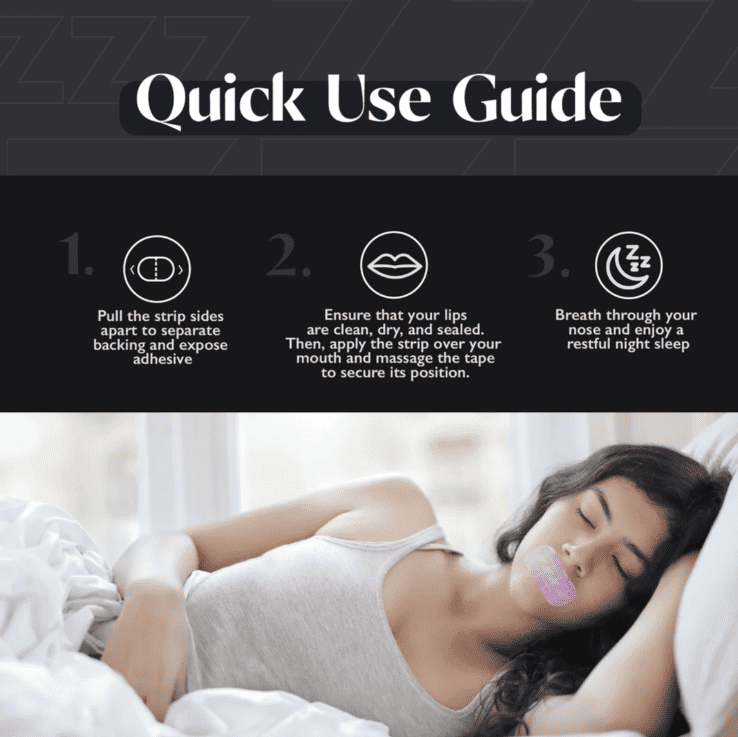
If you choose to try mouth taping, prioritize safety with these guidelines:
- Consult your doctor: Discuss any underlying health conditions and ensure mouth taping is suitable for you.
- Use only hypoallergenic, breathable tape: Avoid harsh adhesives that could irritate your skin.
- Start with short durations: Begin by taping for a few hours during the day to assess comfort and breathing.
- Apply loosely: Leave a gap at the corners of your lips to allow for some airflow in case of discomfort.
- Moisturize the area: Apply a small amount of petroleum jelly around your lips to prevent irritation.
- Remove immediately at discomfort: If you experience any breathing difficulties or discomfort, remove the tape and discontinue use.
Choosing the Right Tape for Mouth Taping
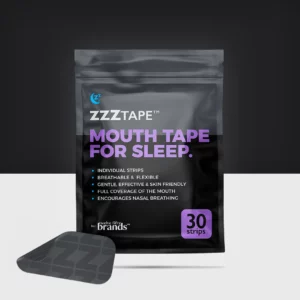
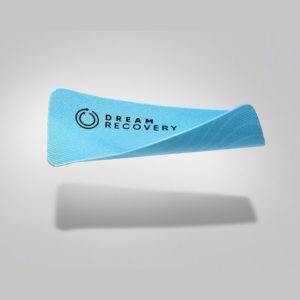
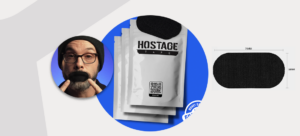
When choosing the right tape for mouth taping, several factors are key to ensuring comfort and minimizing risks.
Opt for tapes labeled as hypoallergenic to reduce the risk of allergic reactions, especially if you have sensitive skin. Additionally, prioritize breathable tapes that allow proper airflow through the material, helping to prevent moisture build-up and discomfort during sleep. Adhesives that allow easy removal without causing skin damage are also essential.
Make sure you select the most suitable tape for effective and comfortable mouth taping. Our recommended option is Hostage tape, a strong yet comfortable tape to help elevate your nasal breathing. Users commend its strong yet gentle adhesive, minimizing the risk of skin irritation or damage.
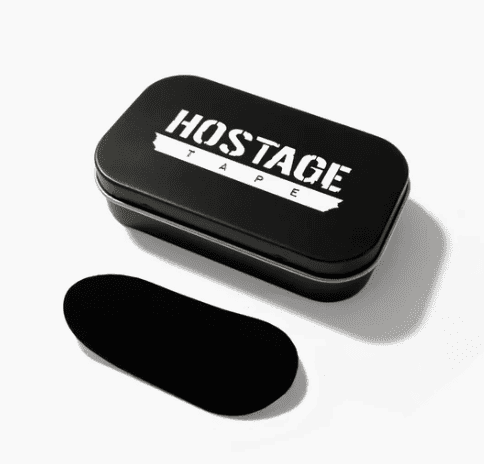
For a detailed insight into why it is the most suitable choice for optimal sleep quality and nasal breathing improvement, you can explore our Hostage tape review.
Mouth Tape and Sleep Disorders
- Sleep Apnea
While some limited evidence suggests mouth taping might slightly benefit mild sleep apnea, it is not a replacement for proper diagnosis and treatment. Sleep apnea requires medical intervention like CPAP machines or other prescribed solutions.
- Snoring
Mouth taping may reduce snoring in some individuals who primarily breathe through their mouths. By encouraging nasal breathing, it can help keep the airway open and reduce vibrations that cause snoring sounds.
- Bruxism (Teeth Grinding)
Mouth taping may indirectly alleviate bruxism for some individuals by improving overall sleep quality and reducing snoring, but it’s not a specific treatment for bruxism itself. If you’re experiencing bruxism, it’s essential to consult with a healthcare professional for proper evaluation and personalized treatment recommendations tailored to your specific needs.
- Dry Mouth During Sleep
When we breathe through our mouths during sleep, it can lead to increased evaporation of saliva and dryness in the mouth. Mouth taping helps keep the mouth closed, promoting nasal breathing, which can help retain moisture in the mouth and reduce dryness.
The Role of Mouth Taping in CPAP Therapy
Mouth taping or similar interventions can complement CPAP therapy for sleep apnea patients by addressing mouth leaks and promoting nasal breathing.
Some individuals using CPAP may experience mouth breathing despite wearing a mask, leading to reduced therapy effectiveness. Mouth taping helps maintain closed lips, preventing air leakage through the mouth and enhancing CPAP therapy’s efficacy.
Additionally, alternatives like chin straps or oral appliances can serve similar purposes, reducing mouth leaks and improving patient comfort. Integrating these adjunctive measures with CPAP therapy can optimize treatment outcomes for sleep apnea patients. Learn more about CPAP and its alternatives for sleep apnea in our informative blog post.
Conclusion: Weighing the Pros and Cons
Mouth taping has gained popularity for sleep improvement, providing benefits like reduced snoring and better sleep. However, risks like skin irritation, discomfort, and even choking exist, especially for those with certain health conditions.
CPAP machines, nasal strips, or positional therapy offer safer alternative approaches to mouth tapes for sleep improvement. Ultimately, the decision to try mouth taping should be informed and cautious, prioritizing your health and consulting with a healthcare professional to explore the best options for a restful night’s sleep.



